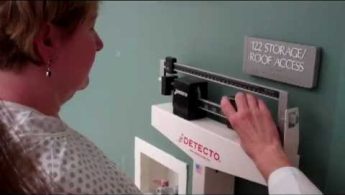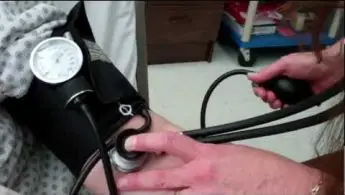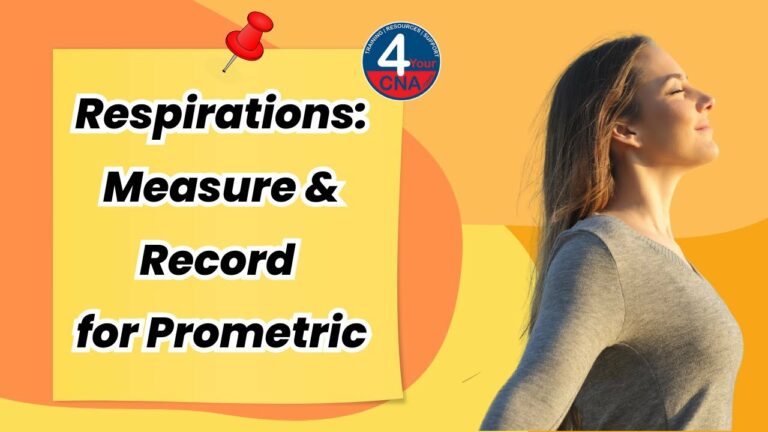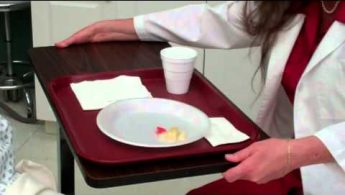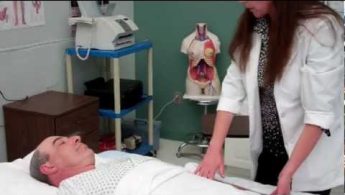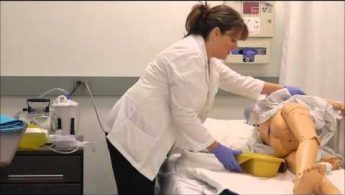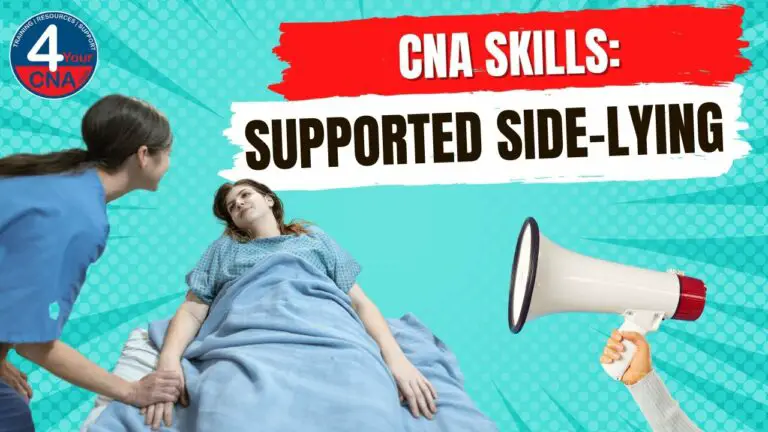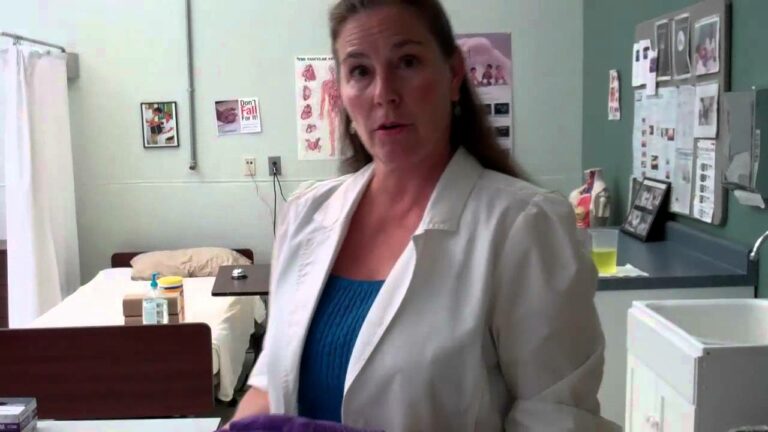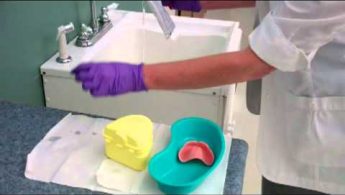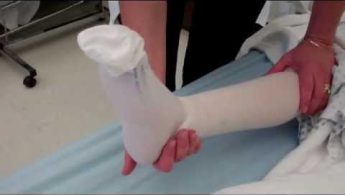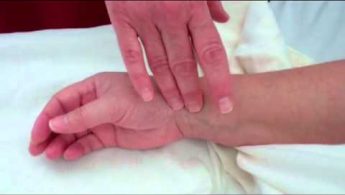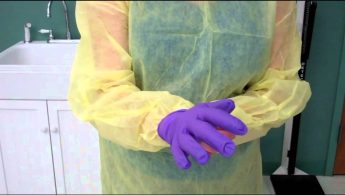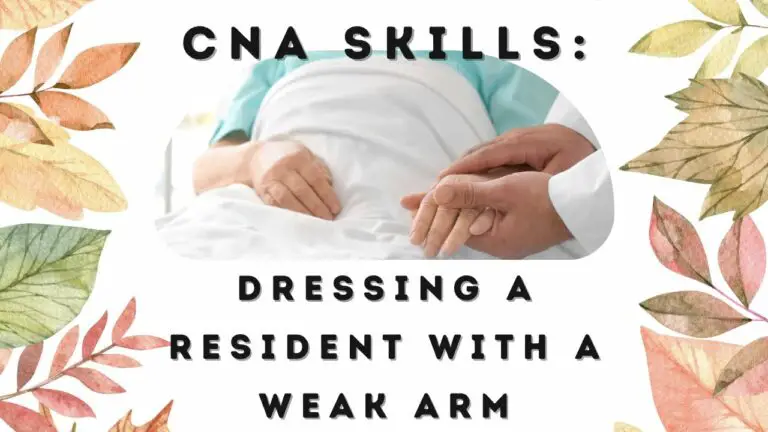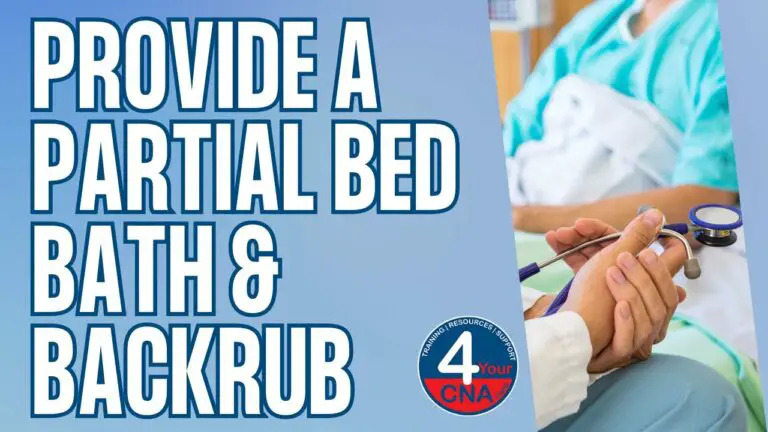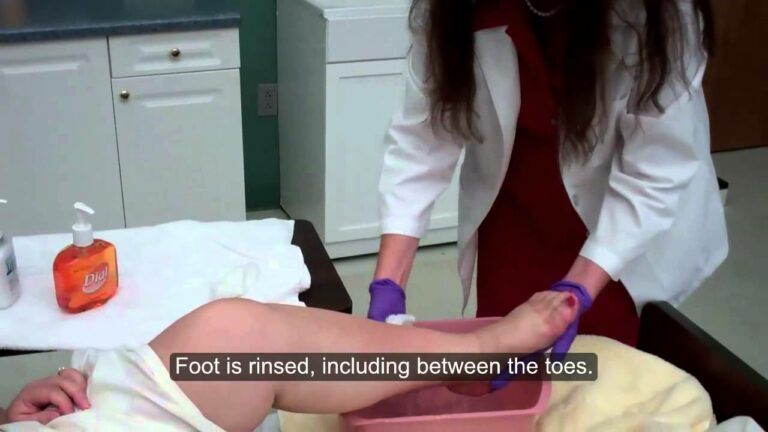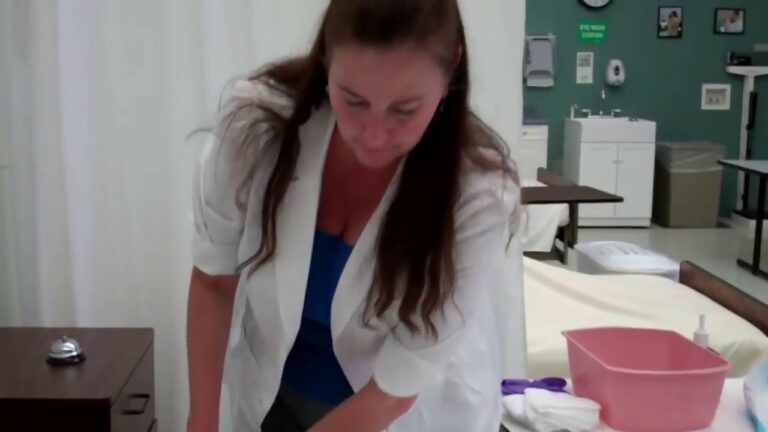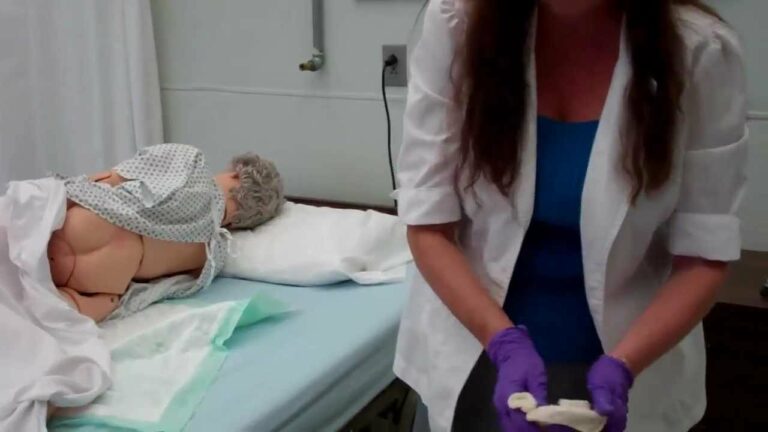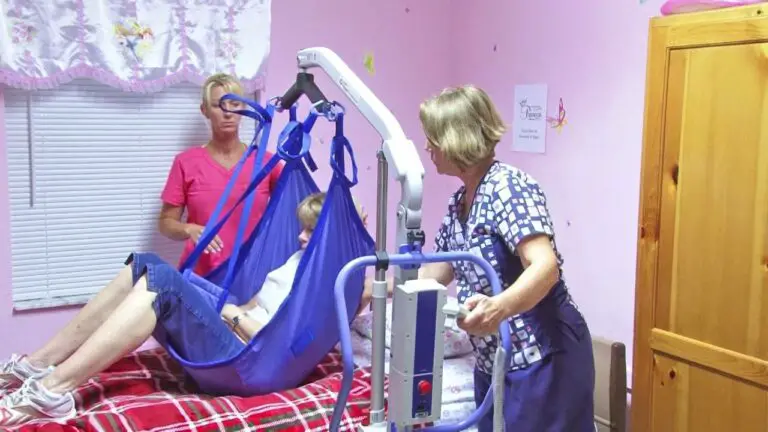A CNA training program must have at least 51 hours of theory classes and 24 hours of clinical training as the certification exam has two papers. The clinical CNA skills test is one of the two papers that to have to pass to clear the certification exam; the other being the theoretical paper.
The CNA clinical skills test refers to the evaluation of the proficiency taught during clinical training; these are CNA practical abilities that you have to use when you assist patients in healthcare. While you are in CNA training you are taught a number of clinical abilities that are necessary to perform as a nursing assistant when you take up professional practice so these tasks are put to test during the CNA skills exam.
The test is conducted under the supervision of the state examiner and he will randomly pick three to five tasks for you to perform. And you are not allowed to slip up in any of the procedures as the examiner will monitor them carefully; he may give you a hint or two as he understands your apprehension. Before taking the exam make sure you have practiced all the craft to the extent of perfecting them so that you will be at ease during the test. Here, we have a detailed guide on CNA skill test. We will walk you through the skill practice, exam preparation, time management during the exam and more.
CNA Skills Test Practice
Below are our CNA clinical skills practice tests, which will help you in preparing for the skills paper and in taking patient care later when you practice as a CNA.
CNA Skills List
This CNA skills list is a good cross-check for you just before the exam. Here is a list of CNA skills which can be divided into the following sub-heads:
1. Safety Procedures
- A CNA must be aware of the safety rails regulations and must carefully move patients on/ off beds and on stretchers without causing any injury; these rails are meant for patients’ comfort and safety
- CNA must be able to raise the head of the bed (HOB) for the various healthcare needs and lower the bed when not needed. You must be cautious that the HOB is not raised when changing patient positions and when patients are sleeping. After all the healthcare activities are over the HOB must be lowered and the bed must be in a flat position.
- Cardiopulmonary restoration (CPR) is one of the abilities a CNA must possess; all CNA programs make it compulsory that the students get a CPR certification
- Having a good hand washing skill is important and must be performed before every healthcare procedure. Good handwashing technique involves wetting the hands properly before applying soap, cleaning between fingers and cuticles, turning off the tap with a paper towel and thrashing that towel and patting the hands dry with another paper towel.
- Use of gloves for all the activities involving body contacts is very essential; sanitization of equipments and proper storage of that equipment is also required. These tasks along with handwashing help in controlling the infection.
2. Nutrition Related Processes
- You must monitor the meals of the patients as per the diet prescribed by the physician
- You must feed patients who cannot eat by themselves due to physical disability due to illness; for patients who have no such disability, you must provide for food trays. You must see to it that the food is provided at specific times.
- Monitoring the intake of food is required so that the patient gets the required nutrition which will be helpful in speedy recovery
- You should monitor the liquid intake of patients who cannot eat food and see to it that the intake is as per the prescription of the supervising nurse
3. Personal Care Abilities
- Bathing patients in bathtub, shower or giving bed bath or partial bath; a CNA must have all the capabilities required for bathing
- As a CNA you will have to provide for oral care of patients by brushing their teeth properly; you have to provide an emesis basin to patients who can’t move and then sanitize that basin and store it in a paper towel
- Grooming abilities are also a part of a CNA job; you must help patients in dressing/undressing and grooming their hair, nail care is another task that you will have to perform
- Making the occupied bed, changing dirty bed linen and disposing of them to laundry is another task of CNA
4. Body Mechanic Procedures
- You must precisely change the body positions of patients at regular intervals. While changing the position you must properly change the position of pillows and see to it that the body is not very straight; bend the knees a bit
- You must be cautious while ambulating patients; patients need to be transferred from one department to another for checkups and need to be admitted and discharged from hospitals. You must have complete knowledge of patient transfer and the documentation regarding it.
- You must help patients in motion exercises so that their body does not stiffen; this involves both upper body and lower body exercises like wrist and finger rotation, snow angel, knee into chest etc.
5. Elimination Tasks
- You must provide patients with bedpans and urinary disposal bags when needed; dump the wastes sanitize the equipment and store it properly
- As a CNA you must take specimen of sputum, stool and urine for tests
- You must provide perennial care for pregnant women
6. Special Procedure Abilities
- Taking vital signs such as temperatures (oral or rectal), blood pressure and pulse and reporting changes to the supervising nurse is one of the tasks that a CNA must be able to do
- While measuring weight you must make sure that the scale is set on zero and the patient patient’s feet are flat when standing on the weighing scale
- When patients suffer from sudden cough you should ask them to take deep breaths
- You may be required to check the EKG monitor and you must be able to apply and remove the leads of the monitor
In addition to the above list of the skills test, a student also needs some additional information on the test, this will help you better prepare for the exam and thus have a good score, Below we will talk about that.
CNA Skills Exam Preparation
The clinical skills test is conducted by a state nurse aide examiner who randomly picks three to five tasks, which you have to perform within 25 to 30 minutes. Here are some tips to ease you through the CNA clinical skills test:
Before the test
You must reach the evaluation center 15 to 30 minutes before the scheduled time for the clinical test; it varies from state to state, so you have to check with the state health department. Here is a list of basic requirements when you arrive at the center:
- You must carry the identification card issued to you by the state body and show it to the instructor on arrival; the I-card will have your photograph with signature.
- The examiner will ask you to empty your pockets and keep your belongings at a place the examiner specifies
- The instructor will show you around the testing room and you will be given a chance to check the equipment you will need during the paper. You can try using the equipment so that you are used to their functionality.
- Check that the supplies required to perform each craft is available in the testing room.
- The examiner will give you a card that will enlist the skills you have to perform during the test. Read the card carefully, listen to the instructions given by the examiner and ask questions to clear any doubts.
- The examiner will inform you when to start with the proficiency and when to be a patient; act accordingly. He/ she will also inform you about the time within which you have to finish performing all the tasks.
During the test
During the practical paper, you have to follow a certain code of conduct as per the requirements of your state. Following are some of the basic set of requirements during the evaluation:
- Most of the practical papers are conducted on dummy patients who are students like you or on a mannequin, so you don’t have to ask them whether or not they need care. You need to perform the skills to exhibit that you have acquired them and can serve as a certified nursing assistant.
- As you must have read the instruction card you know the skills you have to perform; you must execute the craft in the sequence mentioned on the card. You can refer to the instruction card during the exam to avoid any confusion.
- Greet the acting patient or mannequin as you would do to a patient and explain the skills and the procedures involved
- Assume that you are performing each test on a different patient and greet them every time before you perform the next proficiency
- If you think that you have made some mistake and need to correct it, inform the instructor and then perform the correct procedure
- You must wash your hands before and after performing every skill. Ensure that you use gloves when performing tasks involving body contact except for feeding if it is one of the skills you have to perform; while feeding use a spoon or fork as required.
- Another proficiency which you will have to perform is taking vital signs. You will be given a form to record the signs, so after taking the measurement, don’t forget to record it on the form and sign it.
- After each skill, review the instructions to check if you have missed out on something; once you are satisfied that the task is performed as required, say that you are done with it. After announcing that you are done with the skill, you cannot make any corrections, so you must cross-check it in advance.
- The side rails are not taken into consideration during the test, so if the bed has side rails you may choose not to use them; this may vary in some states, so follow the regulations of your state.
- Safety is one of the major aspects the examiner checks during the practical test. If he/she finds that you have made a major mistake in that regard, the evaluation will ask you to make corrections. You will not be graded for the correction because the instructor has notified you what to correct, so be focused on the safety aspect of each skill that you perform.
- The key is to remain calm and focused and carry out a CNA skills review after performing each task. The examiners are aware that you may be anxious and may give you a hint or two. But remember that the prime responsibility of the examiner is to evaluate your skills and grade you accordingly, so don’t expect him to teach you something. It is all up to your abilities and procedures to pass the paper.
Once you have cleared your theory and CNA clinical skills test, you will have to prepare a resume and hence you must be aware of CNA resume skills so that you can make your job search smooth and land a job of your liking.
Time Management During the Exam
During your practical exam, it is important that you manage your time efficiently so that you can finish the tasks within the stipulated duration which is from 20 to 30 minutes depending on your state’s regulation. If you cannot finish it in that duration you cannot pass the test, but in hindsight, the period given is enough to complete your CNA testing. And time management is possible only if you have practiced all your tasks keeping it in mind as each task will require a specific duration, so put this to practice and you will be all right.
Here is how you can manage your time for some of the important tasks:
- Handwashing with all the proper techniques will need one minute to complete the task. Remember that you will have to do this task before and after every other task.
- Blood Pressure measurement and recording will take around two minutes
- Respiration and pulse measurement will take four to five minutes
- Urine output will consume two minutes maximum
- Changing the patient’s position in bed will need two minutes
- Transfer from bed to wheelchair/ stretcher shall take up to five minutes
- Some tasks take longer. Tasks like provide bedpans, making occupied beds or giving modified baths will require more minutes; practice these tasks and once you are comfortable clock yourself. Ideally, you should take seven to eight minutes for this kind of tasks
Make a note of these timings and try to finish the tasks in the times required during your practice.
During the exam, you may be asked to perform a maximum of two tasks that will require a longer period which may take about 10 to 12 minutes to complete and you will still have around 20 minutes to finish the less time-consuming tasks; you will complete all the tasks within stipulated duration, maybe you will have a couple of minutes to spare.
Tips for Taking the CNA Skills Test
It has often been noticed that it is the practical test that students find harder to pass and because of this many students have started taking CNA skills practice tests to polish their clinical abilities and taking these tests is a time-consuming task. Students find the theory paper comparatively easier as they have all the study material available; but it is important that you don’t get too complacent about the theory portion and put in the required hours of study so that you can easily pass the paper.
Below are some considerations which will ensure that you pass the clinical skill test and get certified.
Prepare from Day One
From the day your clinical training classes start you must start preparing for the test, follow a step-by-step procedure and you will succeed in the exam. Organize your study habits from the beginning and follow it till the exams and you will pass the clinical test as well as the theory paper. If you are organized you will have all the required material and abilities necessary to get the certification, so you will not be stressed.
On the other hand, if you do not study enough and cram in a few days for studying and practicing the craft you will be under pressure at the time of the exam. So decide for yourself and prepare from the start.
Plan your Study
Every individual is different and has a different way of functioning both, mentally and physically. You must plan your studies as per your needs. Attend all the clinical classes, listen to your instructor carefully and follow all his instructions. Observe closely as he performs the various skills and makes notes. Sit with your instructor and draw the best methodology for all the tasks.
Make a plan about practicing your tasks and follow that plan, practice the tasks as you learn them. When the lessons are fresh in your mind practicing the skills will be all the more effective. Don’t wait till you are taught all the abilities for practicing them; this is a mistake most students make. When you plan for something you take the responsibility of the task in your hand and when you follow the plan the task is executed perfectly. In this way you will not leave your skills exam to chance, you will act responsibly and achieve your goal.
Use all the Resources
Use all the available resources while preparing for the practical test. Use the study material of the clinical classes as you would have made a CNA clinical skills checklist during the training. There are many study guides available that have books on CNA skills that explain all the procedures of every task in a simple language. Internet is a great source of information; many CNA clinical skills videos available online refer to them as they are performed by experts and you can cross-check your best procedures and make modification if you think that it suits you. To check for the state requirements for the exam get the CNA booklet or candidate handbook as it is popularly known.
Get a Candidate Handbook
Every state has different norms regarding the certification test so it is important that you are well aware of the rules of your state. The CNA test booklet will be helpful to you in this regard. This booklet will have all the information about the state examination, skills that come under the duties of a nurse aide, procedure, and sample questions for your written exam. Follow all the guidelines in the handbook and you will fare well not just in the clinical skills test, but also in the written paper.
Don’t Miss Classes
While you are involved in the training make sure that you do not miss any clinical classes as they are the best chance to master your abilities. You can try it again and again in front of your instructor and he will clear your doubts and notify your mistakes right there. There are many online videos that you can refer to and a lot of study guides to refer to, but no practice is better than hands-on experience, so attend the classes regularly.
CNA Skills Test Help
Most students look for CNA skills test help as they are very nervous about this paper. The anxiousness is more because they have to perform three to five tasks in the stipulated time (usually 25 to 30 minutes) and that too in front of the state examiner. But for the record, most students do pass the CNA practical test on the first attempt; all you have to do is be well prepared with all the required tasks.
Don’t Panic
It is true that you have to perform all the tasks in front of a state examiner, but it is no reason to panic. He/ she is a human being; an experienced one and must have conducted such test a number of times and is aware of your anxiety, so the examiner will surely be a bit lenient.
Don’t Rush
Listen to the examiner carefully before starting out. It is important that you maintain your calmness while performing any task, don’t rush just because you have a limited duration to complete the task because if you rush you may miss out on the minutest details of the procedure.
Relax before the Exam
Two days before the exam get good sleep at night; good sleep is the best stress buster you can get. On the day of the exam arrive on time as specified by your state; some states require candidates to arrive 15 minutes before while others require them to arrive 30 minutes before the exam.
During the exam relax, even if you have to perform in front of the examiner; the important thing is that the examiner will give you a hint or two if you go wrong and if you don’t get any hints make sure you inform the evaluator where you slipped up. The examiner expects that you are aware of all the procedures and will allow minor mistakes if you admit it. Be cautious, not all examiners will be lenient.
Go from Easy to Difficult
Some of the skills of a nurse aide are simple while others are complicated, start practicing the easy tasks first and gradually move on to the difficult ones. This will make you used to the tasks and you will have a progressive method for practicing. Before starting to practice learning the medical terminology; it will be easier to understand the tasks and procedures better. For example, hand washing is a simpler task than taking vital signs or in the more complicated ones, feeding patients is easier than bathing and dressing the patients. So practice hand washing before starting with the vital signs and practice patient feeding before bathing and dressing.
Use Dummy Patients
Not just during your practice test but even when you practice regularly make family members or friends as your dummy patients and practice your skills on them. Follow the proper process of greeting, introduction, explanation of the procedure, and hand washing; don’t skip the part because it is a routine practice at home. If you put in wrong practices you may end up developing habits that can cost you dearly during the practical test.
While taking the practice tests make sure you get assistance from a fellow student as these tests are taken when you begin your final CNA skills review and evaluation. A co-student would be a better person to judge your abilities. During the practice test, you will realize that you are performing all the skills easily because you have put in regular practice.
Follow The Etiquette
While in the exam hall you must follow certain mannerisms carefully; it demonstrates your professionalism. Knock the door and ask for permission before entering any room. Greet the patients and introduce yourself; explain the process before starting the task.
The person in place of the patient may be a fellow student but follow all the procedures as you would do while assisting a patient. Don’t miss out on anything including the safety parameters After you follow all these plans and procedures you will have a clear answer to your question, how to pass the CNA skills exam.
Who Conducts The CNA Skills Test?
The CNA clinical skills test is conducted in presence of an examiner who is an experienced CNA or Registered Nurse and the examiner will carefully observe all the CNA practical tasks that you perform and give grades accordingly. The examiner most of the time is an RN and he/ she will check how accountable you are to become CNA.
Why CNA Skills Test is So Important?
CNA performs their duties as a part of a health care team and are expected to carry out tasks such as
- Understand the importance of verbal and non-verbal communication
- Understand the resident’s right
- Know the responsibility towards the patient
- Personal and Patient Safety
- Maintain cleanliness
Other nursing duties are catheter care, skincare, dental care, dressing and undressing of wounds, providing bedpan and urinal, applying elastic stockings, preparing the bed, serving meal trays and understanding the purpose of modified diets, feeding if necessary, and assisting patients to the washroom.
The certified nursing assistant needs to possess skills to take proper care of the patient and perform the basic medical procedures efficiently. A CNA needs to develop cherished and strong relationships with the patient by providing mental and emotional support.
The personnel duties include giving a sponge bath, trimming nails, combing hair, changing clothes, shaving, and toilet needs. An assistant has to perform these sensitive duties in a very formal and caring manner in order to prevent the patient from embarrassment. The relationship between the patient and the CNA is completely based on trust. All these come under skills.
In conclusion, Passing the CNA exam requires a bit of hard work and focus and you will be able to pass the certification test comfortably. The CNA test skills are guidelines for you to follow so that you can not only pass the practical paper but also the written exam; once you get certified it will prove to be a stepping stone for a rewarding nursing career.

